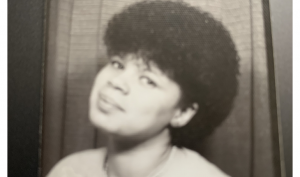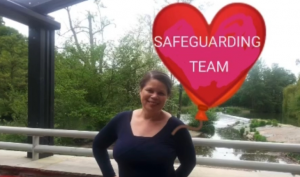Be brave. Be pure. Be kind: reflections of a lifetime in social work

My mission, now I’ve chosen to accept it, is to condense 40 years of social work into a short article. In a nutshell it’s been a varied journey, a wild ride, and the profession I work in now is very different to what it was back then.
In 1983 I was undertaking a two-year social work diploma and Certificate of Qualification in Social Work at Birmingham Polytechnic when I was lucky enough to become salaried in the second year under a venture that provided funds to recruit more social workers of colour to reflect the multi-ethnic demographics of the city.
There was angst over ‘Sus’ (Suspected person) stop and search laws, and the disproportionate number of young Black men who were being diagnosed with and sectioned for cannabis-induced psychosis amongst other things. I qualified against the backdrop of the 1984 miners' strike and the jangling of donation buckets around the Bull Ring and the city centre where I shopped most Saturdays.
I trained as an Approved Social Worker and had to be tethered to the authority for at least two years post-qualification. I undertook three different placements in area offices that somewhat fulfilled the stereotypes of social workers back then – duffle coats; a copy of Socialist Worker on some desks; tripping over heaters in shabby rooms; someone’s dog under the desk; a stairgate and piles of clothes and other donated items in one corner to parcel out to families living below the poverty line; the odd stray youth a worker was looking to place in emergency foster care…
What has survived those times until present day is the tinselled Christmas trees and tins of Quality Street in what remaining office space there is that kept us from collapse before the holiday season really started.
Smoking was allowed, we chipped into a tea fund and lugged around manilla folders of varying weight that encapsulated our clients' lives within the pages. I went into one manager’s office to discuss a case one Friday afternoon and he poured himself a shot from a quart whiskey bottle he kept in his filing cabinet.
There must have been rules and unwritten professional standards but nothing as formalised as today. It was enough that our ‘hearts were in the right place’ and we’d studied Pincus & Minahan’s 1973 Systems Theory as our bible. Cases were debated and discussed when the tea trolley came around at intervals. I learned the nuts and bolts of my profession by listening to the case discussions workers had with each other and how things were resolved over telephone conversations.
I wouldn’t want to be starting out in this profession today because working from home has changed the face and the experience of social work for me. Now team cohesion and comradeship must be sought in a different way, if it can be fully realised at all.

My first base was at the Midland Nerve hospital in Edgbaston, Birmingham, and I was assigned a former matron’s first-floor carpeted room, oak desk and French windows that opened onto a balcony. There might have been a bed in there at one time. There were spectral figures scurrying around the manicured grounds.
I was out in the community frequently assessing people in mental health crises with a view to considering a section. These were often unpredictable and challenging situations. I scaled a mountain of clothes and rubbish in one hoarded house to view and assess the person on the other side.
On another occasion I knocked the door of a high-rise flat with the GP and a police officer I’d thankfully had the foresight to request attended. Mobile phones were a long way off. The young man who let us in was clearly florid and locked the door and removed the key behind us. Not a good sign… It was me and the GP who later took him down to the floor in an undignified scuffle, restraining him when he went for a nearby butcher’s knife.
It was sometimes do or die. I looked up at the young, frozen police officer and said: “Would you mind radioing for help?” A short while later the front door came clean off its hinges and there were shields and helmets flying.
We regularly transported sectioned patients for psychiatric admission in our cars in those days if we thought it was feasible rather than wait an interminable time for an ambulance. Health and safety and risk assessments were not the routine robust things they are today. You used gut instinct and hoped you didn’t come a cropper. The role was adrenaline-fuelled and impactful, and I worried that years of this (the focus was not then so much on prevention) would desensitise me or, worse still, my luck would eventually run out.
Four social workers, a care worker and a volunteer were murdered in the UK between 1984 and 1998. I was working in Birmingham in the 80s when Birmingham social worker Frances Bettridge was strangled to death in 1986 by a man who thought she was planning to remove his children.
The death of Isabel Schwartz, a young social worker stabbed to death in a psychiatric hospital by a former client in 1984, led to the introduction of the Community Care Act 1990. This profession is not without risks and often we don’t know what awaits us on the other side of a door.
Perhaps it was in the interest of self-preservation and weariness from a decade of similarly dramatic encounters that I began turning my thoughts towards someday having a family and I moved to a different field of social work and, indeed, a different county. I’d happened upon Church Stretton in Shropshire when out visiting the antiques market and the sight of the Long Mynd rising majestically above Sandford Avenue captivated me. I settled there within a few months but drove for years from there to the Orthopaedic hospital in Oswestry to serve the wards therein.
The culture shock of moving from work in Sparkbrook, Birmingham, where there was mostly a South Asian and Caribbean population, a vocal workforce and concreted urbanisation, to a rural county with a largely white population required considerable adjustment. There was still hard work but at a more sedate pace and a sense of safety in doing hospital work exclusively.
I at times covered the spinal injuries ward when its usual social worker was off. I have visual memories of having a discussion with a woman who had tripped over her cat and broken her neck falling downstairs. She was in a prone position, just the ceiling to stare at, impossible to make much eye contact. Also, the young man who had clipped a bridge and come off his motorbike. The inevitable ward meeting where they and their family are given the news they won’t walk again.
I often drove home reminded that our lives can change in an instant, functionality can be reduced or lost altogether. My role involved helping facilitate the new normal. I never felt immune from the things that could and did happen to our service users. Even as professionals our own lives have and will be touched by loss, domestic abuse, challenging children, loss of income, health issues, a parent with dementia.
We will all possibly someday need the services we deliver in varying degrees, so we want to continue to refine them to a point of excellence. I often reflected on my own interventions by asking myself, “Is this what I would want for my loved one?”

After several years I moved nearer to home and worked a large caseload in a physical disability team out of a day centre in Ludlow. It was a tiny team – just me, a social work assistant and the team manager. I covered the south of the county and did work in the community assessing people for care packages and related services. I’ve been into hundreds of homes in four decades, and in this county there were caravans and small holdings to access too.
I remember snapshots – the ageing farmer whose work was jeopardised as he tried to look after his wife as she slipped into dementia. He pointed to her in a pinafore in an armchair that was streaked with milk. She was engaged in repeatedly pushing a curved lambing bottle filled with milk into the arm fabric to keep an imaginary lamb alive. This was important to her as being useful and productive was once an integral part of her life.
Her absorption provided her husband with a valuable hour or two each day to do his chores. To be effective and to build rapport you had to enter another’s world without prejudice, appreciate the things they valued, and suspend judgement. You can’t leave your humanity at the door.
Appreciation and acknowledgement can be rare but if you make a difference to even one life then that’s a win. I and many social workers garnered thousands in unclaimed benefits and grants for people over the years and that in turn empowered them, improved quality of life and lifted families out of poverty.
In the old days social work was inadvertently about ‘doing to people’; now it has evolved into doing with, co-production. I was in Ludlow market with my sister one Saturday some years ago. An elderly couple reached out and pulled my hand. They remembered me as their social worker. They’d reared their grandson who had autism from his formative years but had fought the system and a succession of social workers to keep him.
When I was assigned the referral as he had turned 18, I was met with reserve and mistrust. They had nothing good to say about the profession. I disarmed them with transparency by saying I had barely met anyone with autism but wanted to work with them to achieve the goal of moving their grandson out and towards a life of independence. I had knowledge and skills to share about resources etc and wanted to learn from them too.
I established a relationship with all three as best as I could and completed a comprehensive assessment that reflected everyone’s views. I was able to secure a nearby flat through a housing association for him, grants and money from charities led to it being fully furnished. The young man in question spent weekends there before fully moving in.
I told him I would put six weeks of care in because I was confident he would get established at college and learn transport routes, cooking skills, social networks and everything else well within that time. He did exactly that.
His grandparents reclaimed the life they once hoped for and told me in the market that day that they’d had their first ever holiday alone. They thanked me again, but I explained it was a team effort, they were the experts by experience, the real heroes of the piece. We had all worked towards the same goal – a more positive definition of ‘joint enterprise’.
The time in question signalled and epitomised Shropshire’s move towards person-centred, strengths-based practice and it was a humbling and affirming experience to know that while I didn’t always get it right, I had appropriately embedded those principles with that family and that particular piece of work. As they left, they looked at me with the fondness and appreciation of a daughter. These are the recollections I take into retirement that give me some satisfaction.
I rose up the ranks to a senior social worker and moved down to Craven Arms in south Shropshire, working from the newly built Gateway offices we shared with housing. Physical disability had by then merged with older people. I was part of a bigger team spanning Bridgnorth and the rest of the south. I had responsibility for supervising others. My manager and I had both been around so long we sort of grew up together professionally. I always valued her calm and measured pragmatism and support. I have her to thank for encouraging me to take up a manager’s secondment in adult safeguarding and my subsequent line manager and wonderful mentor for entrusting that and the permanent position to me.
I’ve spent the final seven years or so of my professional life in this field working in a very skilled, knowledgeable and dedicated safeguarding team and it’s been the most rewarding phase of my career, not least because of the integrity and great competency of the team itself. A significant improvement between ‘then’ and ‘now’ is the spotlight shone on domestic abuse – one of our highest referral areas – and the police intervention and resources assigned to the resolution of it.
The role has had its challenges, and we all suffer imposter syndrome at times, but I grew considerably in the role both in terms of knowledge and professionalism. This was no doubt aided by a couple of leadership courses and most recently the Getting Leadership Right programme that I personally found impressive, thought-provoking and growth-full. It says a lot about a council willing to be a front-runner in investing time and money in its workforce in this way.
Perhaps that’s why, once I moved to Shropshire Council, I never felt the urge to leave or explore pastures new. Things here are done well, people have great professional integrity, training is abundant and excellent, colleagues are supportive, and there is always an impetus to refine and improve ourselves and our work in what is a dynamic council.
The saying is true that if you love what you do, you’ll never do a days’ work in your life. Well, the vocation is hard and demanding but it bears fruit and we each make a difference every day.
I have learned that it's okay to not know everything, to be fearful, vulnerable, to make mistakes – if you don’t linger in that space, are accountable and learn lessons from events.
In my late 20s I took lay ordination in Buddhism. As the Abbot initiating me put a prayer scarf around my neck he said: “Be brave. Be pure. Be kind.” Are these not some of the key principles of social work? Courage to knock on doors, the courage to stand on our convictions and decision-making. To be pure equates to integrity and the ethics and professional standards of the profession, and being kind speaks for itself – compassion in action.
This is in essence a valediction to all those I knew and worked alongside over the decades. I shall sincerely miss you and the work itself. I will shortly train as a best interests assessor to keep my hand in. Ironically the circle will close where it began – with me once again having client contact, doing in-person assessments with people whose minds may be impaired, protecting their liberty just as I did in the mental health field in my 20s.
But really the bulk of my retirement will be spent in creative writing, putting my feet up, shepherding the final child through university and travelling the world with my wonderful partner.
Forty years in social work has given me a treasure trove of people and memories to sustain me during times when retirement will surely sometimes feel like a small bereavement. I wish you all fulfilment and contentment in your work until your turn also comes to hang up your (duffle?) coat for the last time and retrieve your coffee mug.
Until then, Be brave. Be pure. Be kind.
